Seniors find help in coping with social distancing during coronavirus crisis
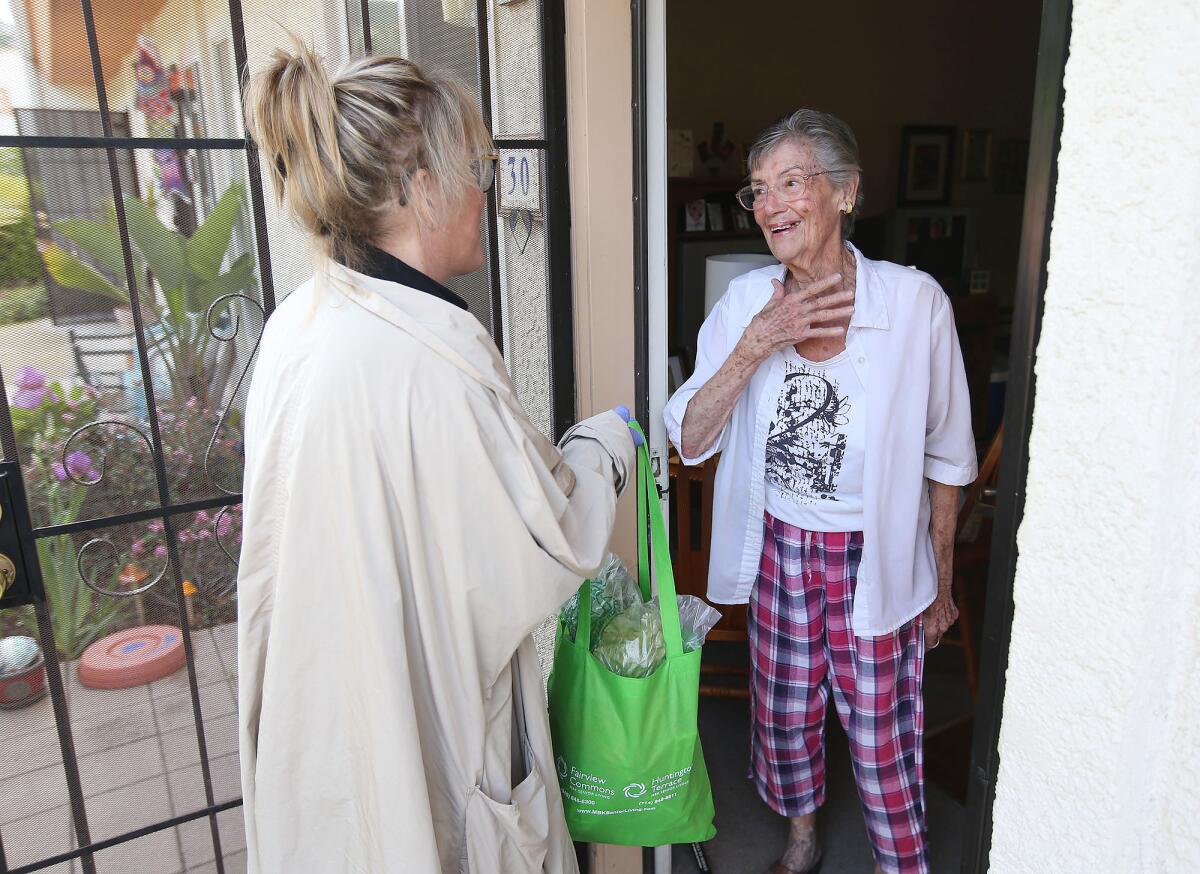
- Share via
Courtney Wight said she forgets sometimes.
A neighbor was giving things away Tuesday and Wight left her Laguna Beach home to see what was available. But as people came up and talked to her, she remembered — “‘I shouldn’t be here,’” she thought.
The next day, Wight, 82, returned to self-isolating in her home in accordance with state recommendations for people 65 and older to stay home to help curb the spread of the coronavirus that causes the respiratory disease COVID-19.
The state directive affects 5.3 million senior citizens and was extended to include people with chronic conditions, who are considered the most at risk of contracting the illness.
Gov. Gavin Newsom issued an order Thursday for all Californians to stay home, except when performing necessary activities such as getting food or medical care.
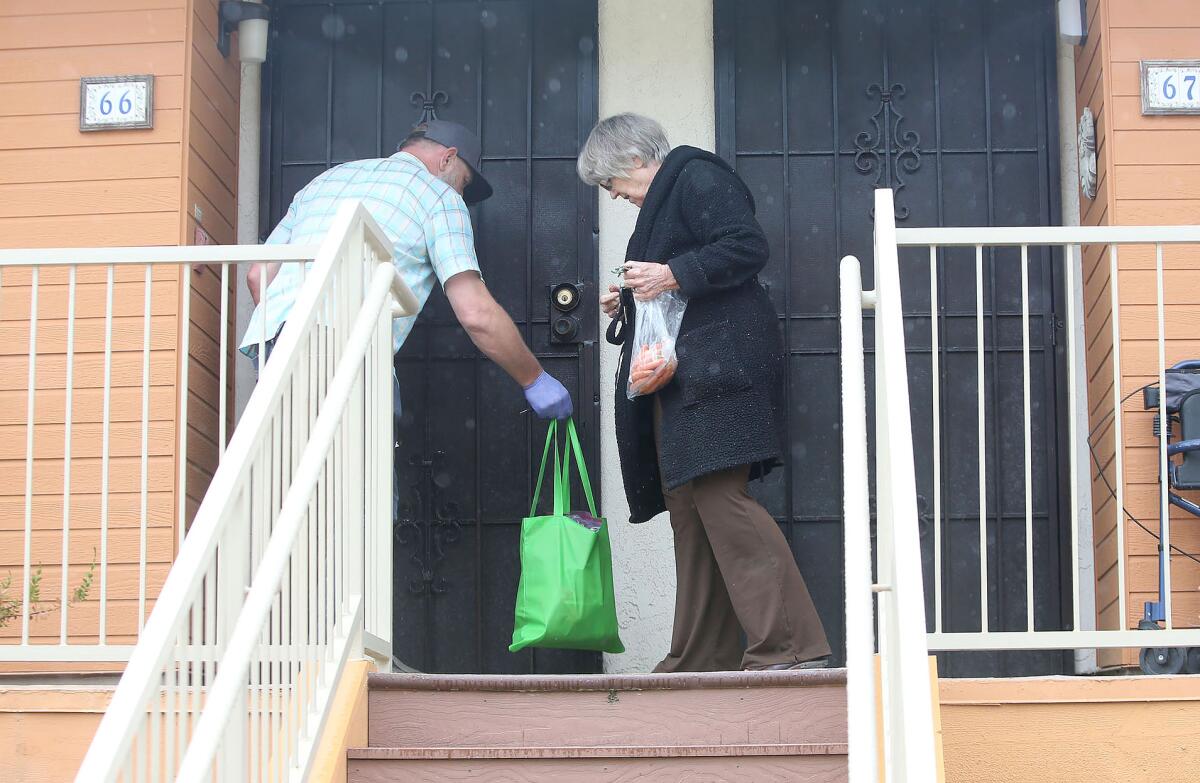
The call for social isolation is causing the temporary closure of several gathering places for older residents across Orange County.
For Bob Harrison, 80, that includes the Orange County Model Engineers.
Since the organization temporarily closed its train operations a couple of weeks ago, Harrison isn’t going to Costa Mesa’s Fairview Park as much. Instead, he made a rail yard a little closer to home: in his living room.
“My wife’s upset with me a little bit,” he said.
Harrison’s age and previous bouts with pneumonia put him in the high-risk category for coronavirus. He stocked up on groceries a couple of weeks ago and has since kept close to home. To stay busy, he’s tinkering with the model train — adding a rail here, running the engine.
It reminds him of his days growing up on a farm and driving to the railroad tracks to watch the trains roll by.
He plans to return to the Fairview Park rail yard next week, but only to unlock the door for a termite inspector.
For the most part, he’s spending his time cleaning out old magazines, teleconferencing for International Society of Automation meetings and chatting through the door with his twin 11-year-old grandsons, who live down the road.
“I’m not doing a lot of things, but I’m not going to give up seeing those two little boys grow up,” Harrison said.
Social isolation can be tough for many people, and for senior citizens it can even be unhealthy. A report last year by the National Institute on Aging said social isolation and loneliness are linked to higher risks of high blood pressure, heart disease, obesity, a weakened immune system, anxiety, depression, cognitive decline, Alzheimer’s disease and even death.
About 28% of older adults in the United States live alone, according to a report by the Administration for Community Living’s Administration on Aging of the U.S. Department of Health and Human Services. Many of them do not feel lonely or socially isolated. At the same time, some feel lonely despite being surrounded by family and friends, the report said.
Wight has been playing Words with Friends since she started self-isolating March 13 and eating chocolates, chips and guacamole — “all the things you’re not supposed to be eating,” she joked.
“I do have a book here, but I just can’t bring myself to start reading it,” Wight said with a laugh. “I’m trying to get my money back on a concert I was going to go to ... it was an hour wait, so I hung up. I guess people are trying to get their money back from everything.”
She said her children and grandchildren are more worried about COVID-19 affecting her than she is. She thought they worried that everyone would give it to her.
Wight feels March 13 was the “breaking point” for a lot of seniors, including herself. That was two days after Newsom called for the cancellation of gatherings of 250 or more people across the state in a major escalation of efforts to slow the coronavirus. It was quickly followed by mass cancellations of local events.
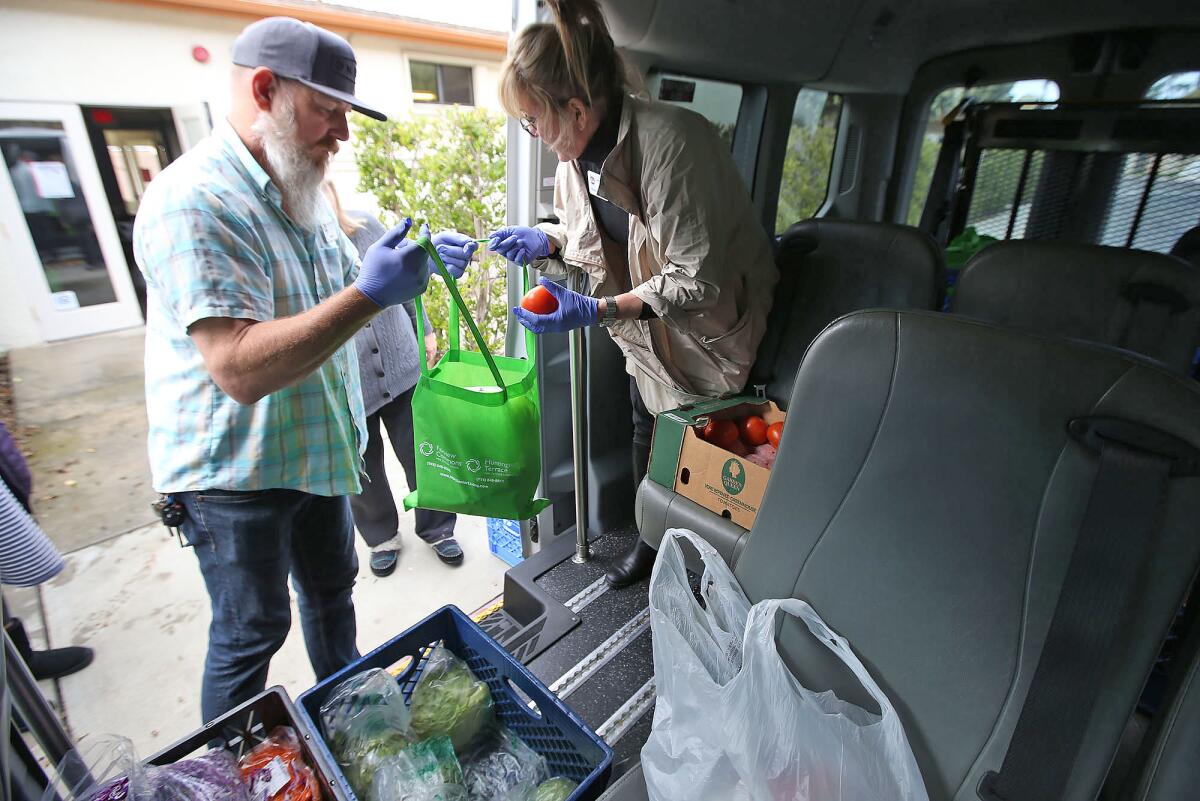
“I had been out to lunch before, gone to yoga, thinking ‘Oh, this isn’t a big deal’ and then everything changed,” Wight said. “I was touching people and everything till that day. ... [Then] all our classes were canceled.”
She said the hardest part for her self-isolation is resisting the urge to go outside and talk to people as they pass by.
“When people walk by my house — I live on a street where people walk — I’ll go outside and talk to them. I’ll be 10 feet away, at least,” Wight said. “But a lady hugged me yesterday. I gave her some flowers and she said, ‘I don’t believe in this. I don’t get the flu’ and she hugged me before I could do anything about it. I don’t even know her that well.”
But as anxious shoppers sweep through markets and empty shelves, Wight said she still needs to get groceries for the week. Her daughter, who lives in Long Beach, and her neighbors dropped off some supplies.
With Laguna Beach’s Community & Susi Q Center closed and all senior classes and programming canceled, Sally’s Fund, a senior outreach program based in Laguna, partnered with the Laguna Food Pantry to help provide for people who rely on the senior center’s daily lunch program.
AgeWell senior lunches were canceled, but the city said Meals on Wheels would be helping those in need.
The Sally’s Fund program is still operating and continuing to take seniors to doctor’s appointments and pick up prescriptions. Its primary focus is on groceries and other necessities, said Rachael Berger, executive director of the nonprofit.
Berger said there has been an increase in requests for assistance lately.
“In person, I am seeing that seniors are a little anxious,” she said. “They are unsure of what is happening out here. They still are asking for us to take them to the senior center, but we have to tell them they are closed and will be for quite some time. They don’t fully understand.”
This week alone, Sally’s Fund picked up more than 70 bags of groceries from the Laguna Food Pantry.
“It takes quite a bit of time to deliver. Our driver Jason Pastore is going above and beyond to explain to each senior the new guidelines: stay six feet away, no hugging, etc.,” Berger said. “They don’t really understand the extent of the virus, and he is doing an amazing job explaining in great detail.”
“My goal is that for all the seniors we serve, we’re going to be calling them to make sure they’re not alone, not isolated, we’re here,” she added. “This is the only thing we can do right now — alleviate their fears.”
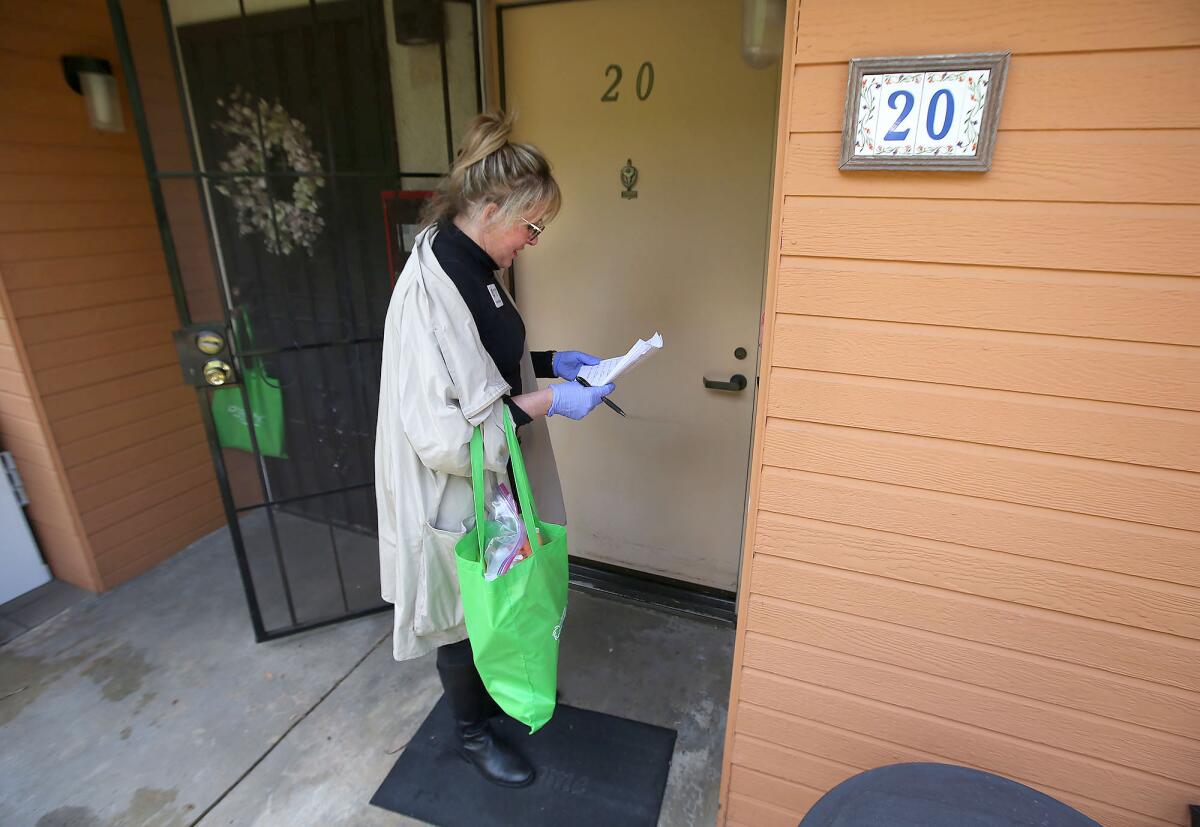
Help is pouring in from local community members.
Berger said managers at Gelson’s and CVS stores set aside toilet paper for the organization to pick up and purchase for seniors, and the Laguna Food Pantry has been assisting with food to be taken and dropped off around the city.
Meanwhile, Ruth Sanchez-Kobayashi organized what she called a “youngers helping olders” system in her Newport Beach subdivision.
She ran off several copies of a printable form she found online. The forms, to be hung on the front door knobs of neighboring senior citizens, let them know that people are willing to run errands for them and how to place their requests.
Using volunteer “street captains” whom Sanchez-Kobayashi marshaled on social media, every street has a delegate in the close-knit neighborhood so everyone will know who needs help.
That method gets around many seniors’ lack of use of electronic tools such as email and social media, Sanchez-Kobayashi said.
As facility closures and social distancing continue, the crew next may set up a plan to check in on housebound seniors with a phone call, she said.
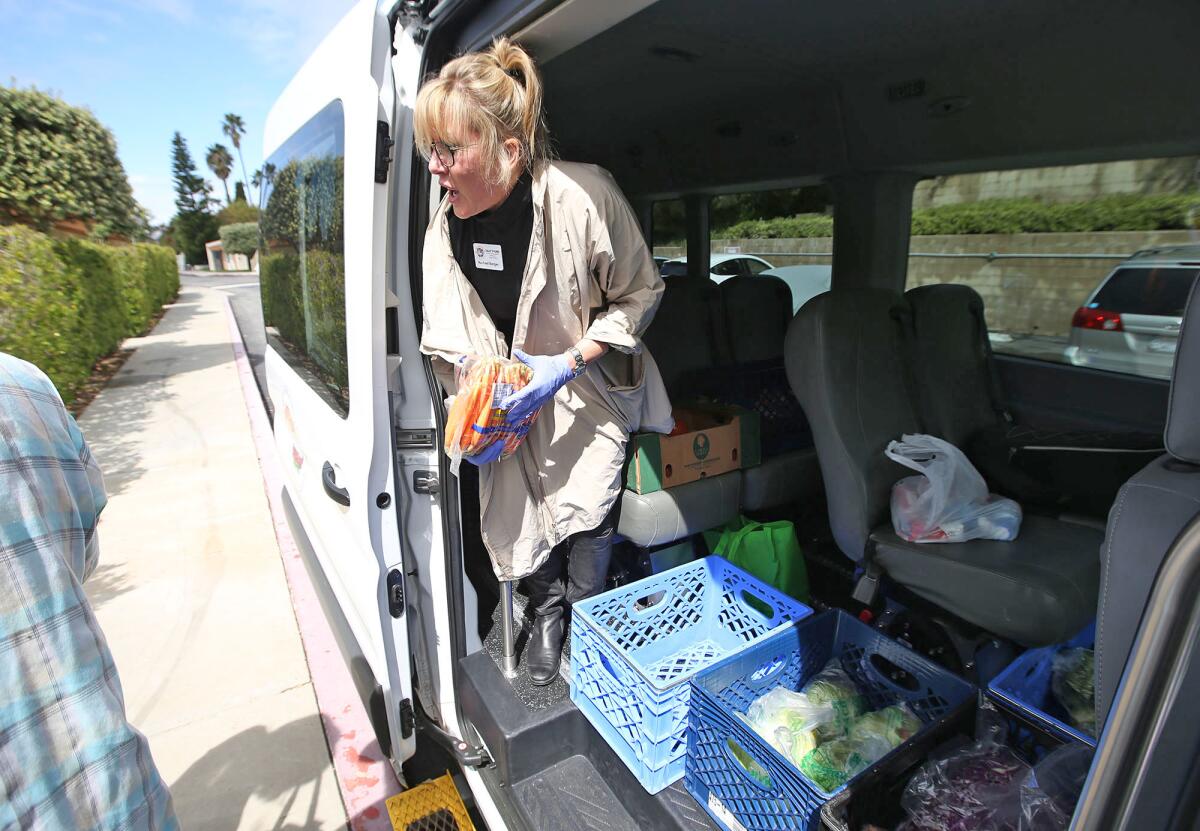
Debra Marsteller, president and chief executive of Project Independence, a Costa Mesa-based nonprofit that supports people with developmental disabilities, said many clients are on limited incomes and don’t have the space or money to stockpile groceries.
“The people that are most at risk are hit the hardest by [other people] hoarding,” Marsteller said. “We had people who didn’t have toilet paper.”
She put out a call on the Nextdoor app and other social media. Soon, toilet paper began to appear on the office doorstep. Every day, she said, more packs arrive. Others have dropped off fresh fruits and vegetables. Staff members, most of whom have been working from home, are delivering the toilet paper to some of the 650 Project Independence clients.
“It’s just been very enchanting, really,” Marsteller said. “It’s been such a tough time worrying about everyone. We get through that, but it’s the nice things that make me cry. ... People are so generous.”
Project Independence staff was scheduled to take Bobby Spitzberg, 61, from his home in Costa Mesa’s Harbor Village to Vons’ special shopping hours for disabled customers and senior citizens Friday morning. Staff members visit every night to help him make dinner too.
Spitzberg is off for six weeks from his job in the laundry room of the Irvine Marriott hotel. He’s spending much of his free time laughing at the antics of Barney Fife, the goofy deputy on the old “Andy Griffith Show.”
“I’m just taking it easy,” Spitzberg said. “Just relaxing and enjoying my time off.”
Marsteller said Project Independence just received masks to protect staff members who visit people in their homes. And in January, Marsteller’s son, an immunologist, gave the nonprofit’s staff a training session on best practices against the coronavirus — weeks before the virus received widespread attention.
As for Wight, she said she’s doing OK for now.
“We’re not into it far enough. If it’s a month off and we’re still doing this, then everybody’s going to go crazy,” she joked. “I’m communicating enough that I’m OK. But next week I think will be a different story. I have Netflix and HBO.”
All the latest on Orange County from Orange County.
Get our free TimesOC newsletter.
You may occasionally receive promotional content from the Daily Pilot.






